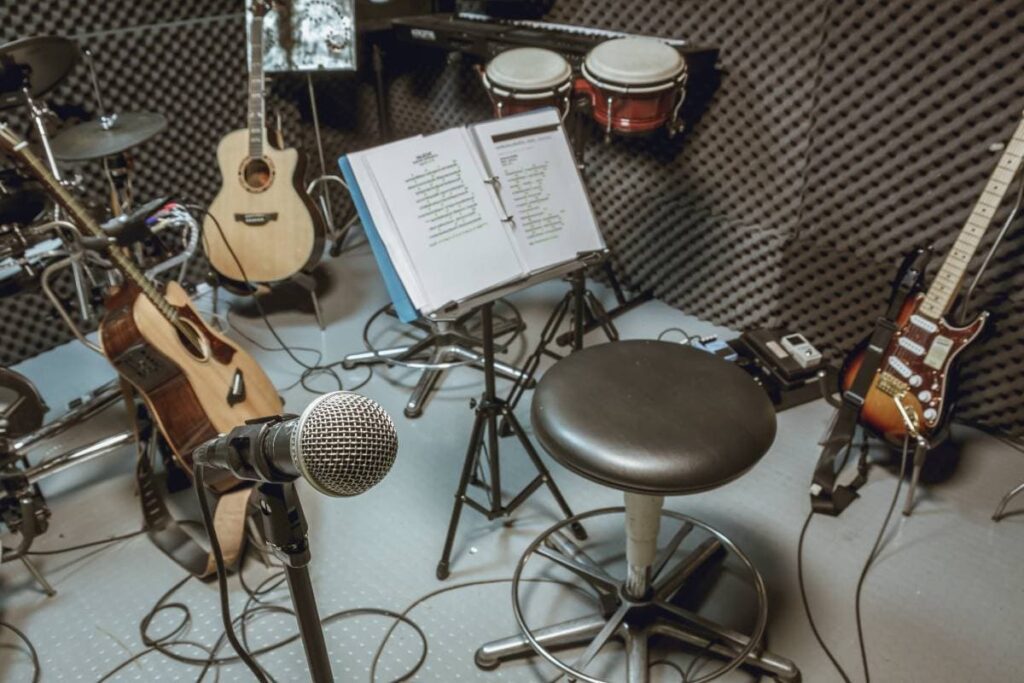As a home studio recorder, you may balk at costs like that of high-end microphones. If you only have a Shure SM58 microphone, can you record guitars with it?
You can record electric and acoustic guitar with an SM58 mic. While an acoustic guitar can be recorded directly by placing this microphone over the sound hole, an electric guitar will require an amplifier and speaker or combo to produce the sound that the SM58 mic will pick up.
In this article, I’ll look at how you can record both your electric and acoustic guitar with a Shure SM58 microphone. I’ll also include a detailed guide on achieving a professional recording with this microphone using both electric and acoustic guitars. Finally, I’ll look into other recording mics you may want to consider, and other factors that affect the quality of recording guitar.

Table of Contents
- Can You Record Guitar with SM58 Dynamic Microphone?
- How To Record an Electric Guitar With SM58 Dynamic Mics
- How To Record Acoustic Guitars With an SM58 Mic
- The Best Microphones for Recording Guitars
- Other Factors That Affect the Quality of Your Recording
- Final Thought on Recording Guitar with an SM58 Mic
Can You Record Guitar with SM58 Dynamic Microphone?
Usually, the Shure SM58 Mic is a live vocal mic for recording vocals when it comes to music production. Let’s take a closer look at the same mic and recording guitar with this dynamic microphone.
We’ll discuss what its capabilities are, and what dynamic mics can do with acoustic guitars and electric guitars with guitar amps when recording guitar tracks.
How To Record an Electric Guitar With SM58 Dynamic Mics
If you want to record an electric guitar with a Shure SM58 dynamic mic, you need a way to play the electric guitar out loud.
The simple solution for this is a combo — that is, a portable combination of an amplifier and speaker in a single piece.
Place the dynamic microphone against the grill of the cabinet, pointing at the middle of the speaker.
Depending on the type of combo guitar amp you have, you need to tweak the EQ and other settings until you get a sound you like. Once you have a sound setting you want to work with, you’re ready for recording guitar.
Connect your SM58 microphone to your audio interface and find the best place to position the dynamic microphone in front of the amp while the guitar is playing.
Here are a few microphone placement tips to guide you. Note that in each case, the microphone should always be on a microphone stand.
- Place the dynamic microphone against the grill of the cabinet, pointing at the middle of the speaker.
- Only place the microphone against the grill if it’s a cloth grill. For metal grills, allow a small space to minimize background noise from the metal rubbing against the microphone.
- If your combo or speaker cabinet has two speakers, identify where the sound you like best is coming from and point the microphone towards that speaker.
- Move the microphone away from the cabinet to introduce some room sound into the recording. Try different distances until you get the balance that works for you.
Once you’re done with the positioning, set the gain at an optimal level. The highest point of the gain level should be just touching the orange level on the meter.
After all of the above is done, you’re ready to record.
How To Record Acoustic Guitars With an SM58 Mic
Recording an acoustic guitar with an SM58 microphone is much easier than recording an electric guitar.
Since the acoustic guitar delivers its sound without the need for any form of amplification, you only need to place the microphone in front of the guitar to begin to record.
That said, there are a few tips for positioning the microphone to achieve a recording of good quality.
- Don’t aim directly for the sound hole, as you won’t be able to capture the guitar’s complete tone from this point.
- Don’t place the microphone too close to the guitar so you don’t capture excessive fret noise, finger slaps, and other sounds associated with playing.
- Place the guitar at about 6 inches (15.24 cm) from the guitar.
- Position the microphone between the sound hole and the neck so you can capture a fuller guitar sound.
Once your microphone is in the best position, set the gain at the optimum level and begin to record.
The Best Microphones for Recording Guitars
While you can record your guitars with an SM58 microphone, it’s not necessarily the best way to do so.
As your home studio grows, you may want to invest in better mics that achieve the recording quality you want while still being budget-friendly.
For example, the best microphones for recording acoustic guitars include:
- Shure SM81
- Shure SM57
- Beyerdynamic M160
- AKG C451 B
- Rode M3
- sE Electronics Voodoo VR2
- Fishman Matrix Infinity Mic Blend
- LR Baggs Lyric
- Aston Microphones Origin
Any of the popular microphones listed above will be an improvement on the SM58. However, the level of improvement will vary from microphone to microphone.
Other Factors That Affect the Quality of Your Recording
When doing any kind of recording, you should consider factors other than your microphone to ensure the best recording quality.
Interface
The audio interface into which you plug your microphone is crucial as it determines the quality of recording you can achieve.
Be sure to choose an interface with a sample rate of at least 44.1 kHz and 16 bits. Many affordable interfaces exceed this sample rate, so you should have no problems with this part.
Cables
One common mistake among recording newbies is not understanding the importance of the cables used. Your sound is only as good as your weakest link in the audio chain.
Therefore, you should invest in professional microphone cables to ensure you can record while keeping any extraneous background noise to a minimum.
Location
Where you record your guitar (whether it’s acoustic or electric) is very important. Your room noise can add a tasteful ambiance to your recording, or it can completely ruin it.
Avoid recording in rooms with a lot of reflections or noise coming in from outside.
To reduce sound reflections, you can do the following:
- Place a rug on the floor in the area of the room where you’ll be recording.
- Place an absorbent surface behind your recording position. This can be a bookshelf or blanket.
- Have an absorbent surface above your playing position.
- Let the surface facing you have an absorbent surface.
These steps should help you reduce the amount of reflection without completely deadening the room.
Final Thought on Recording Guitar with an SM58 Mic
You can record electric and acoustic guitar with a Shure SM58 microphone.
However, you’ll need to do a little more work to ensure you get the best recording quality possible. If you don’t like the sound coming from your SM58, you can always invest in other microphones.
Speaking of guitars, check out my collection of the greatest guitars in the Country Music Hall of Fame. I took a photo of every single guitar in this historic building.
Don’t forget to consider the other factors that affect recording quality, such as interface, cables, and recording location.
- Review of the ALABS IRON MINI-WL: A Powerhouse Wireless Microphone - October 4, 2023
- What is a Saturator in Music Production: A Brief Explanation - May 11, 2023
- What Are Rotary DJ Mixers? An Overview - May 11, 2023
SoundStudiomagic.com is a participant in the Amazon Services LLC Associates Program, an affiliate advertising program designed to provide a means for sites to earn advertising fees by advertising and linking to Amazon.com. We also participate in other affiliate programs which compensate us for referring traffic.

